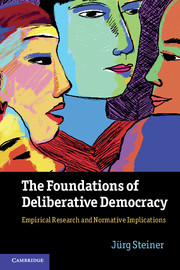Book contents
- Frontmatter
- Contents
- Figures
- Acknowledgments
- Introduction
- 1 Citizen participation in deliberation
- 2 Rationality and stories in deliberative justification
- 3 Common good and self-interest in deliberative justification
- 4 Respect in deliberation
- 5 Public openness of deliberation
- 6 Force of better argument in deliberation
- 7 Truthfulness in deliberation
- 8 Deliberation in the media and the Internet
- 9 Favorable conditions for deliberation
- 10 Favorable consequences of deliberation
- 11 The praxis of deliberation
- Appendix Newest version of Discourse Quality Index (DQI)
- Index
- References
10 - Favorable consequences of deliberation
Published online by Cambridge University Press: 05 August 2012
- Frontmatter
- Contents
- Figures
- Acknowledgments
- Introduction
- 1 Citizen participation in deliberation
- 2 Rationality and stories in deliberative justification
- 3 Common good and self-interest in deliberative justification
- 4 Respect in deliberation
- 5 Public openness of deliberation
- 6 Force of better argument in deliberation
- 7 Truthfulness in deliberation
- 8 Deliberation in the media and the Internet
- 9 Favorable conditions for deliberation
- 10 Favorable consequences of deliberation
- 11 The praxis of deliberation
- Appendix Newest version of Discourse Quality Index (DQI)
- Index
- References
Summary
Normative controversies in the literature
While theorists have paid little attention to the conditions that lead to good deliberation, they have always been very interested in speculating about the consequences of good deliberation. Generally speaking, the expectation among theorists is that deliberation has favorable consequences. Claudia Landwehr makes this argument at a general level:
The theory assumes that the exchange of reasons in communicative interaction forms and transforms political preferences, and that if the interaction is sufficiently deliberative, they are transformed to the better. Preferences evolving from deliberation are expected to be better informed and less self-interested: besides the own perspective, they take into account the knowledge, experiences and interests of others.
For Jürgen Habermas, “deliberation causes a pressure for rationality that improves the quality of the decisions.” For John S. Dryzek, deliberation is “a means for joint resolution of social problems … a large public policy literature points to the effectiveness of deliberation on the part of those concerned with a common problem in generating solutions that are both effective and mutually acceptable and that can work when top-down solutions are resisted by those whose interests and arguments are overridden.” Giovan Francesco Lanzara postulates that deliberation opens opportunities for new and beneficial actions for the community. Daniel Oliver-Lalana, a legal theorist, states with regard to the legislative process “that there exists a link between the quality of a law and that of its underlying reasoning: broadly speaking, the better is the legislative argumentation the better will be the law resulting from it.”
Information
- Type
- Chapter
- Information
- The Foundations of Deliberative DemocracyEmpirical Research and Normative Implications, pp. 219 - 246Publisher: Cambridge University PressPrint publication year: 2012
References
Accessibility standard: Unknown
Why this information is here
This section outlines the accessibility features of this content - including support for screen readers, full keyboard navigation and high-contrast display options. This may not be relevant for you.Accessibility Information
- 1
- Cited by
